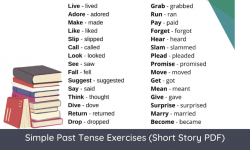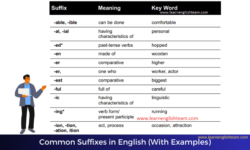List of Phrasal Verbs for Everyday Actions
In this phrasal verbs list, you will learn phrasal verbs organized by / related to ‘basic actions’. Phrasal verbs are generally more common in spoken or informal English than in written or formal English. However, phrasal verbs can be used in both formal and informal situations.
Phrasal verbs are important part of everyday English conversations. That’s why it’s important to know them. Phrasal verbs sometimes seem absolutely random, and sometimes they make sense… There are easy ways to learn English Phrasal verbs. You can download our FREE Phrasal Verbs PDF.
Check Also:
2000+ Common Phrasal Verbs List From A-Z (Free PDF)
Common Phrasal Verbs List and Examples (PDF) ✅
Phrasal Verbs with COME (PDF)
Useful Phrasal Verbs List: Basic Actions
Fall down
If someone or something falls down when they have been in an upright position, they drop to the ground.
“He tripped and fell down.”
Get off
If you get off something that you are on, you move your body from it, usually onto the ground.
“He got off his bicycle.”
Get out
If you get out, you leave a place or a vehicle.
“We got out of the car.”
Get up
1. When someone or something gets up or gets up something, they move from a lower position or level to a
higher one.
“By the time we’d got up to the top of the hill, we were exhausted.”
“I knew he would have difficulty getting up those steps.”
2. If you get up, you rise to a standing position after you have been sitting or lying down.
“He got up off the floor.”
3. When you get up, or when someone gets you up, you get out of bed.
“She decided it was time to get up.”
“We had to get the children up and dressed.”
Go back
If you go back, you return to a place where you were before.
“I have to go back to the US next week.”
“It started to rain so I went back for my umbrella.”
Go in
When you go in, you enter a building.
“Let’s go in and have some coffee.”
“I pushed open the door of the office and went in.”
N o t e: The opposite of go in is go out.
Go into
When you go into a room, building, or area, you enter it.
“She went into the bedroom and shut the door.”
Go off
If you go off somewhere, you leave the place where you were, usually in order to do something.
“He’s gone off to work.”
Keep down
If you keep down or if you keep your head down, you stay in a lying or low position in order to avoid being seen or attacked.
“The soldier signaled to him to keep down.”
Lay down
If you lay something down, you put it down on a surface.
“He laid the baby gently down on the changing table.”
Move up
If someone or something moves up or moves up a place, they go from a lower position to a higher one.
“The sun had moved up in the sky.”
“We moved up the hill a few metres.”
N o t e: The opposite of move up is move down.
Run in
If someone runs in from outside a room or building, they enter it, moving fast.
“I’ll run in and get them.”
Run into
To run into a place means to enter it running.
“They had run into the nearest apartment and asked for help.”
Run on
If you run on, you continue to run in the same direction.
“I ran on ahead.”
Run out
1. If you run out of a room or building, you leave it, running.
“He ran out of the room and down the stairs.”
2. If a substance runs out from somewhere, it flows from there.
“Water was running out from under the front door of the house.”
Sit down
If you sit down or sit yourself down, you lower your body until you are sitting on something.
“We were both looking for a place to sit down.”
“She sat herself down beside me.”
N o t e: The opposite of sit down is stand up.
Stand up
If you stand up, you change your position so that you are standing rather than sitting or lying.
“The pupils stand up when the teacher comes into the room.”
N o t e: You can also use get up.
Turn back
If you turn back or are turned back, you stop a journey and return towards the place you started from.
“It was getting dark, so we turned back.”
“We were turned back by heavy snow.”



